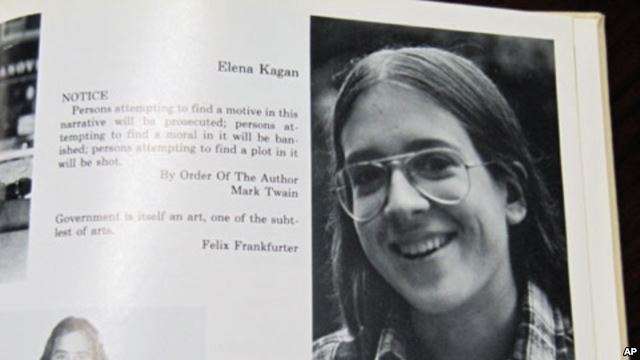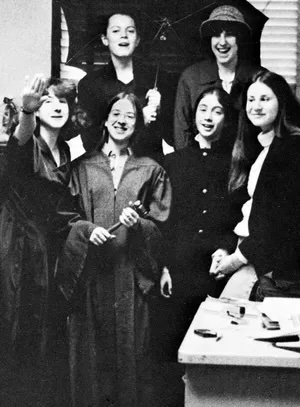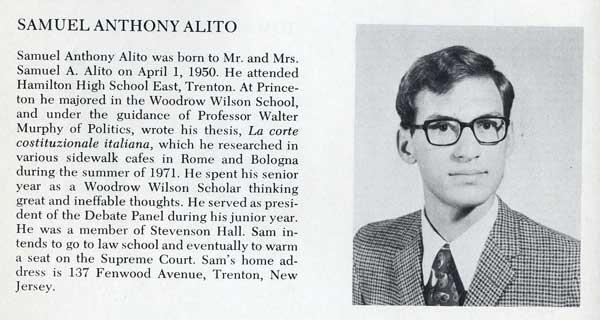The Volokh Conspiracy
Mostly law professors | Sometimes contrarian | Often libertarian | Always independent
Becoming Justice Barrett
Justice Barrett's new book is not a memoir. Though she sprinkles the book with some anecdotes about her family, Listening Law is quite guarded concerning how Barrett came to be where she is now. Her press appearances have likewise been fairly controlled, and she seems to repeat the same sets of pre-scripted answers. Yet, if you read between the lines, we can start to tie some threads together.
The first thread is that Justice Barrett did not aspire to be a judge before becoming a lawyer. Barrett's father was an attorney. But the Justice said in a recent press appearance that she wanted to be a teacher, like her mother. By contrast, some of Barrett's colleagues had their sights on the bench at a young age. In her high school yearbook, Elena Kagan wore a robe and held a gavel, and included a Felix Frankfurter quote. Samuel Alito's Princeton Yearbook said, "Sam intends to go to law school and eventually to warm a seat on the Supreme Court." Justice Jackson said that Judge Constance Baker Motley (with whom she shares a birthday) was a "North Star for me in my career." I don't get the impression that a young Amy Coney aspired for the bar or the bench, in the ways that some of her colleagues did.

Second, even after Barrett clerked for Justice Scalia, it still does not seem that she aspired to the bench, at least not right away. As a law professor, she did not do the sorts of things that an aspiring judge would do. I've written before how Barrett did not become a member of the Federalist Society until 2014. And prior to Justice Scalia's passing, she did not attend the Federalist Society National Convention, and did not speak at any FedSoc events.
I did not ever see Barrett in person until 2017, after she was already nominated to the Seventh Circuit. I was not alone. Ed Whelan recalls that he met Barrett for the first time at a memorial for Justice Scalia in November 2016, shortly before the election.
In the cafeteria before the ceremony, I sat down at a table with other former Scalia law clerks, and I met for the first time a Notre Dame law professor by the name of Amy Coney Barrett. Little could she or I have imagined that four years later she would become President Trump's third appointee to the Supreme Court and complete his process of transforming the Court into a body that would expand and entrench Scalia's legacy.
I consider Ed Whelan as one of the most plugged-in people in the conservative legal movement. He knows everyone, and remembers everything. How could it be that Whelan had never met her before? It appears that Barrett not only didn't attend any FedSoc events, but also did not attend the Scalia clerk reunions. "Little could" Whelan imagine that Barrett would make it to the Supreme Court. I suspect Professor Barrett in 2016 likewise could not have imagined at that point in time what would happen.
Were Barrett to write a memoir, I think this is the story she would have to tell. Most of her colleagues who made it to the Court took a series of deliberate and strategic actions throughout the course of their career to make it onto the bench, and later on the Supreme Court. At a minimum, they all served in government or some other public service. Barrett, other than clerking for two prominent judges, did none of these things. Indeed, she declined the various opportunities to put herself a position to be recognized as a potential judge--other than being a popular law professor at Notre Dame.
There is a third, and related thread. Justice Barrett by her own admission did not fully understand how she would be criticized as a Justice. For example, she told Jan Crawford:
"If I had imagined before I was on the Court, how I would react to knowing that I was being protested, that would have seemed like a big deal, like, 'oh, my gosh, I'm being protested,'" she says. "But now I have the ability to be like, 'Oh, okay, well, are the entrances blocked?' I just feel very businesslike about it. It doesn't matter to me. It doesn't disrupt my emotions."
She made similar comments in other venues--something to the effect of, I could have never imagined that X would happen. I've made the point many times that Professor Barrett was never subject to any sort of public scrutiny. Much was made of the "dogma" moment, but the full video tells a different story: A senile Senator asked a bizarre question, and Barrett just stared back blankly and didn't say a word. This was not exactly courage under fire.
Let me tie the three threads together. First, I find it refreshing that a young Amy Coney Barrett did not clamor to be a judge. Frankly, I find it a bit pretentious when young people say they want to become judges. I've rolled my eyes at many 1Ls who tell me they aspire for the bench.
Second, I also find it refreshing that Professor Barrett did not structure her career with an eye towards becoming a Supreme Court Justice. Indeed, I've written that anyone who wants to be a Supreme Court Justice should be immediately disqualified from the job. But there is also a problem with the inverse situation: someone who never planned to become a Supreme Court Justice yet is somehow elevated to that position.
That brings us to the third thread. Because Barrett was never tested before becoming a judge, there was no way to predict how she would handle pressure when she becomes a Justice. Justice Gorsuch knew first hand from his mother's experience how D.C. works. Justice Kavanaugh had been at the center of many major controversies in his tenure. But what about Barrett? President Trump, or at least those advising Trump, took a gamble on her.
There is a fourth, and related thread: Because Justice Barrett was not acculturated in the conservative legal movement, it was unknown who would prove influential to her. Now, Barrett has confirmed what I have long speculated: Justice Kagan has proven to be an influential colleague. Jan Crawford's piece relays:
Still, Barrett insists that kind of language doesn't affect her relationship with Jackson, and that she works to have relationships with all the other justices. She says she enjoys talking about the law with Justice Elena Kagan, also a former law professor who, like Barrett has a more formalistic approach to the law than the Court's two other liberals, even though it leads them to very different places.
In a recent interview, Bari Weiss of The Free Press asked Barrett to give one word for each of her colleagues. For Kagan, Barrett chose "analytical." That's a word she also used in our conversation to describe herself.
I have written a lot about the Kagan-Barrett bond, and speculated (to much criticism) that Kagan was using that bond to influence Barrett's opinions. There were a (small) number of cases where Kagan joined Barrett's separate writings, Vidal v. Elster in particular. But here we have Barrett acknowledging what I suspected. I don't think Barrett has singled out any of her other colleagues with similar praise. Certainly she hasn't said these sorts of things about the other Trump appointees.
Recall that Kagan went out of her way to make friends with Justice Scalia. She even went hunting with him! Query how often Kagan has gone hunting since Scalia's passing? I would wager the number is zero. Kagan, the former Dean, is very savvy, and knows how to play to people. This is precisely why Laurence Tribe urged President Obama to nominate Kagan over Judge Sotomayor: she would be able to persuade Justice Kennedy. Now, Kagan can persuade a Scalia disciple without even having to pick up a gun. She can naturally exude the "analytical" mode of a law professor.
Yet, I have wondered over the past few months whether this relationship is faltering a bit. In earlier emergency docket rulings, Justice Barrett ruled more consistently with Kagan. But more recent orders have Barrett (likely) joining the conservative majority. And Kagan has taken shots at a majority opinion Barrett (likely) joined. Let's see what happens on the merits docket this year.




Show Comments (18)